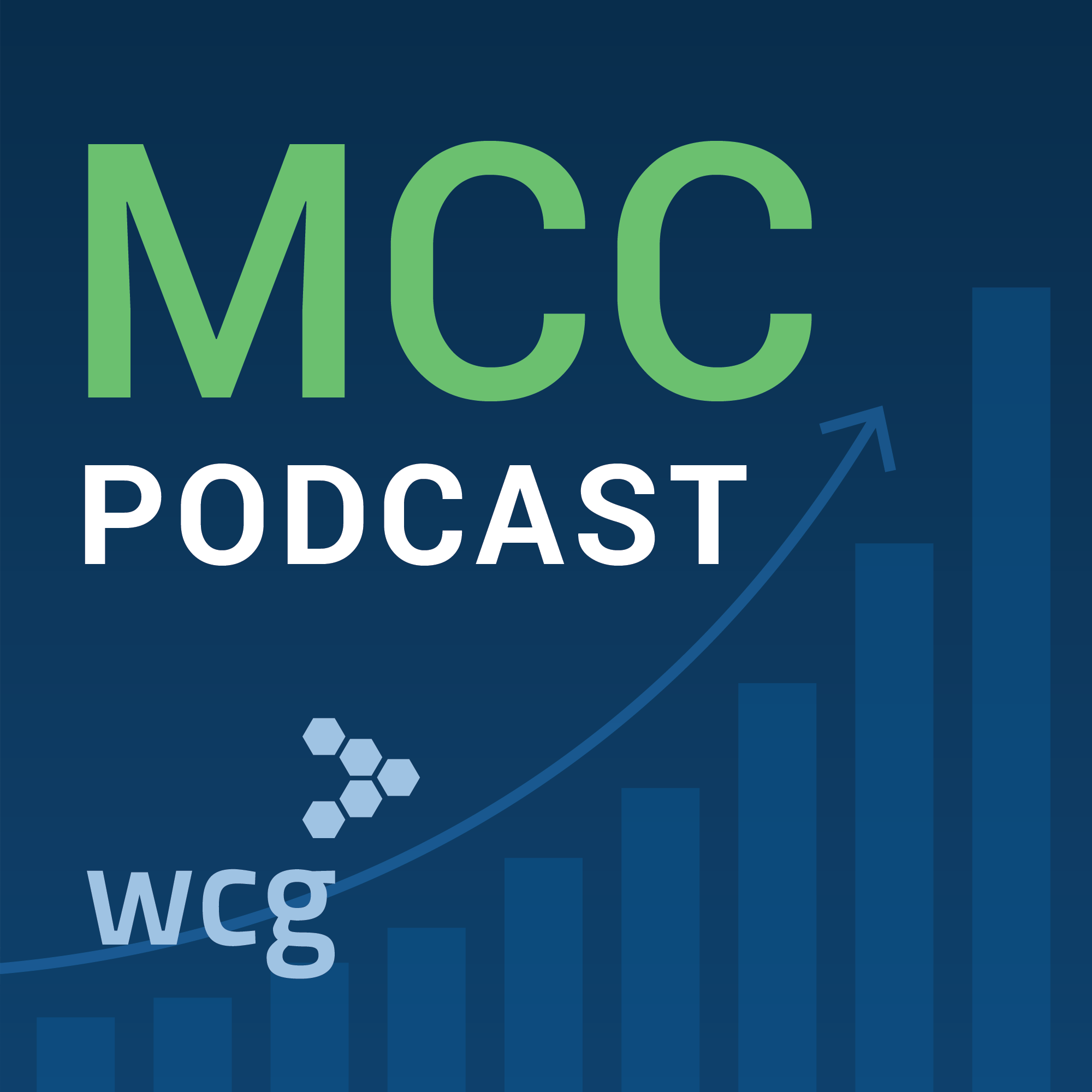MCC is the place to meet industry peers, exchange ideas, collaborate and think.
Podcast

MCC has launched a podcast. We'll be discussing the major issues affecting you, from Quality-by-Design, to risk based quality management and vendor oversight.
Subscribe today!
Apple Podcasts Spotify Stitcher Android
EPISODE 1
Impact of COVID-19 with Laurie Halloran
In this first episode, host Linda Sullivan chats with Laurie Halloran, founder of the Halloran Consulting Group, about how she developed an on demand drug development team that can fill in gaps in the clinical trial process for life science companies, whether these involve regulatory strategy or execution, or quality, clinical, or manufacturing issues. The COVID-19 pandemic has resulted in these companies having to pivot to more virtual experiences. At the beginning of the outbreak, she notes, her group organized town halls that made it clear to stakeholders that life science companies had to implement telehealth and other remote monitoring solutions to protect patient safety. As a result of the pandemic, Halloran explains, her group is reviewing clinical trial protocols to determine how technology can be better utilized in the collection of clinical trial data. In conclusion, Halloran says, “don’t waste this opportunity” to make your clinical trial program more resilient.
EPISODE 2
Drug Development with Ken Getz
In this episode, Linda chats with the incomparable Ken Getz, the Deputy Director and a professor at the Tufts Center for the Study of Drug Development, Tufts University School of Medicine, where he conducts research focusing on drug development management and operating strategies and tactics; protocol design practices; and global outsourcing, investigative site, and patient recruitment practices and policies. Getz describes how the Center chooses topics for study, which can emanate from passionate industry professionals or from information gleaned at conferences and then implemented through working groups. At any given time, the Center is working on 12-15 studies, including recent research on participant diversity in clinical trials and upcoming research on possible reduction in time between phases (white space) in clinical trials and patient-centered initiatives. The pandemic has acted as an accelerator in a variety of areas, including remote and virtual visits, telemedicine, and data management, which could result in increased customization and choices to support clinical trials, according to Getz. It’s an exciting time for clinical trial professionals as new technology, including AI, increasingly comes into play. And in the TRIO segment, you’ll want to hear Getz’s answers to these questions: What the biggest challenge facing the clinical trials industry? What’s the best new innovation? What‘s your top optimization takeaway?
EPISODE 3
Get Rid of Those Silos: Linda Sullivan, Artem Andrianov, and Johann Proeve on How To Optimize Clinical Trials through RBQM
Linda chats about Risk-Based Quality Management (RBQM) with Artem Andrianov, CEO of Cyntegrity and Johanna Proeve, Chief Scientific Officer at Cyntegrity. Artem says his vision is to create the “Bloomberg for Pharma,” a platform that shares RBQM risk mitigation strategy information across the industry. Artem adds that Cyntegrity’s technology platform allows organizations to manage the entire quality management cycle, rather than continuing with a traditional “siloed” approach. This holistic approach, he explains, enables pharmaceutical companies to become more efficient in reducing risk. Johann discusses how organizations are recognizing that, especially during this pandemic, Excel doesn’t always work for managing RBQM, especially in larger clinical trials, and that companies — both CROs and sponsors — are implementing RBQM technology and asking for additional training. Additionally, the onslaught of COVID has led to data quality deterioration — a development that Cyntegrity, with its robust platform — has been able to help customers assess and monitor. And in the TRIO segment, you’ll want to hear Artem’s and Johann’s answers to these questions: What is the biggest challenge facing the clinical trials industry? What’s the best new innovation? What‘s your top optimization takeaway?
EPISODE 4
The Upside of Centralized Monitoring During a Pandemic: Linda Sullivan, Duncan Hall, and Rachel Oakley on Optimizing Clinical Trials through Innovative RBQM Technology
How are clinical trial companies pivoting to implement Risk-Based Quality Management programs during the pandemic? That’s one of the deep dives explored in Duncan Hall’s and Rachel Oakley’s interview with Linda Sullivan, MBA, Executive Director of WCG’s Metric Champion Consortium (MCC). Hall, founder and CEO of Triumph Research Intelligence (TRI) and Oakley, Vice President of RBQM Services at TRI, note that, when the COVID-19 pandemic first hit, CROs and sites performed risk assessments on their existing studies. Then those organizations took advantage of innovative technology that had a key tool for optimizing clinical trials — centralized monitoring. According to Hall and Oakley, that tool enables critical oversight and monitoring of investigational sites, even when in-person visits are not feasible. They point out that regulatory agencies are issuing new guidance during the pandemic, and that sponsors, CROs, and sites need to figure out how to comply with both those new mandates as well as existing rules. According to Hall and Oakley, there has been a renewed sense of community in the industry in dealing with the pandemic as stakeholders try to stay current through a variety of trusted sources, including MCC’s weekly COVID calls. Finally, they note, one component for optimizing clinical trials is taking center stage — training, especially in the area of RBQM.
EPISODE 5
Striving for Reliability: Optimizing Patient-Reported Data through World-Class Design Management with Linda Sullivan, Nat Katz, and Art Morales
Can patients be trained to report their symptoms more accurately? That’s one of the key topics discussed in Nat Katz’s and Art Morales’ interview with Linda Sullivan, MBA, Executive Director of WCG’s Metric Champion Consortium (MCC). Katz, the Chief Science Officer of WCG-Analgesic Solutions and Morales, Vice President, Technology Solutions at WCG, assert that, with proper design and implementation, you can structure clinical trials, such as pain management studies, so that patients learn how to better report their symptoms. With proper training, patients learn to accurately report their symptoms, resulting in more reliable data, according to Katz and Morales. During COVID-19, they add, sponsors have had the opportunity to examine ways to introduce new technologies, such as telehealth, to clinical trial operations and to use more science-based tools for evaluating the performance of clinical trials. COVID-19 also has accelerated the scientific evaluation of clinical sites by optimizing the analysis of patient data. The result: Clearer and more reliable data collected during the conduct of study — without unblinding the data.
EPISODE 6
The Case for Centralized Monitoring: Optimizing Data Quality and Risk Management with Linda Sullivan and Steve Young
How can CROs and sponsors detect potential problems and issues in clinical trial conduct and data quality? That’s one of the critical issues discussed in Steve Young’s interview with Linda Sullivan, MBA, Executive Director of WCG’s Metric Champion Consortium (MCC). Young, Chief Scientific Officer at CluePoint, discusses how risk-based quality management (RBQM) methodology, data analytics, and data surveillance are being utilized today to go beyond just ferreting out fraud. Now, Young says, clinical trial stakeholders are deploying advanced statistical engines to detect quality and data breaches in investigational studies. According to Young, while there are still instances, to varying degrees, of major misconduct in clinical trials, CROs and sponsors are increasingly turning to online solutions to risk planning. It’s important, he adds, that when risks are discovered, the solutions are integrated into the workflow of clinical trials. In fact, Young asserts, one of the biggest challenges facing the industry today is to embrace change and accept the use of centralized monitoring data to aid in the discovery and resolution of risk.
About MCC
Leading the drug-development enterprise in the adoption and utilization of standardized metrics and benchmarks to drive performance improvement. Founded in 2006, MCC is the leading industry association dedicated to the development of standardized performance metrics to improve clinical trials. MCC provides the collaborative environment for biopharmaceutical and device sponsors, service providers and sites to improve clinical-trial development through use of MCC standardized performance metrics.

300 N. Washington St., Suite 200, Falls Church, VA 22046, USA
Phone: 317.622.0266
metricschampion.org
